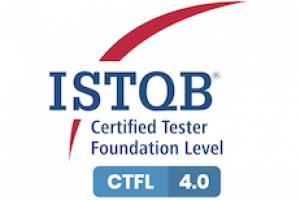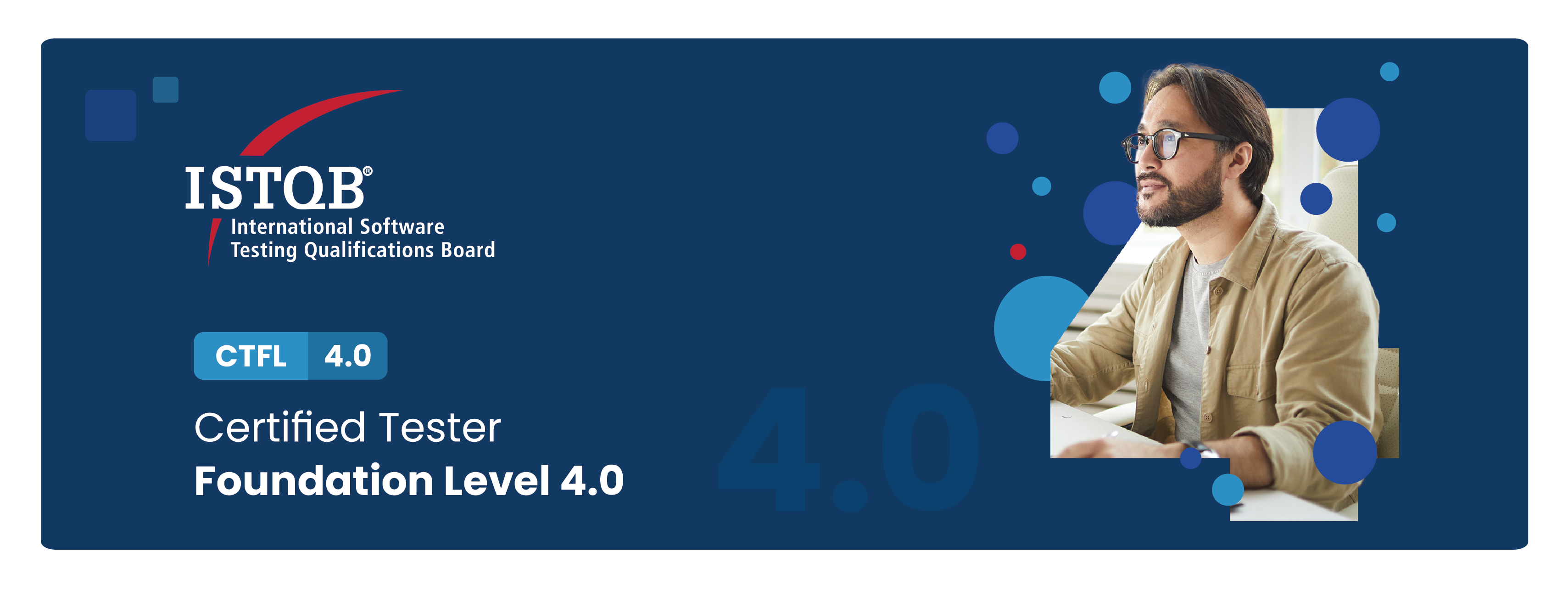ISTQB® CTFL v4.0 Syllabus - An Exciting Milestone in Software Testing
Article published by Petr Neugebauer, on 19.7.2023
The ISTQB® Foundation Level Syllabus 4.0 was launched on May 9th, becoming the anticipated new global standard in software testing. As the new syllabus marks an exciting milestone in the field, we are delighted to present the key changes and advancements it brings.


Introduction
Understanding the ISTQB® CTFL v4.0 Certification
Key Changes to the ISTQB® CTFL v4.0 Syllabus
| Chapter | Content | What’s new/updated? (Versus v3) |
| Chapter 1: Fundamentals of Testing |
|
|
| Chapter 2: Testing Throughout the SDLC |
|
|
| Chapter 3: Static Testing |
|
|
| Chapter 4: Test Analysis and Design |
|
|
| Chapter 5: Managing the Test Activities |
|
|
| Chapter 6: Testing Tools |
|
|
Changes in Business Objectives (BOs) and Learning Objectives (LOs)
- Understand what testing is and why it is beneficial
- Understand fundamental concepts of software testing
- Identify the test approach and activities to be implemented depending on the context of testing
- Assess and improve the quality of documentation
- Increase the effectiveness and efficiency of testing
- Align the test process with the software development lifecycle
- Understand test management principles
- Write and communicate clear and understandable defect reports
- Understand the factors that influence the priorities and efforts related to testing
- Work as part of a cross-functional team
- Know risks and benefits related to test automation
- Identify essential skills required for testing
- Understand the impact of risk on testing
- Effectively report on test progress and quality
The Foundation Level v4.0 syllabus comprises the following LOs in each knowledge level (K1, K2, and K3) compared to the Foundation v3.1.1 and Agile v2014 syllabi:
- 14 K1 LOs compared with 21 LOs in FL v3.1.1 (15) and AT 2014 (6)
- 42 K2 LOs compared with 53 LOs in FL v3.1.1 (40) and AT 2014 (13)
- 8 K3 LOs compared with 15 LOs in FL v3.1.1 (7) and AT 2014 (8)
Validity of ISTQB® CTFL Exams
CTFL 3.1 and CTFL 4.0 Exam Availability:
- The ISTQB® CTFL 3.1 and ISTQB® CTFL 4.0 exams will be available in English until May 09th, 2023, and until November 09th, 2024, in Czech and Slovak.
- Syllabus version CTFL 3.1 (2018), along with training and exams in English, will only be available until May 9th, 2024.
- Non-English syllabi (Czech and Slovak translations), training, and exams for the 3.1 version will be available until November 9th, 2024.
- CTFL 4.0 exams in English will be available from September 1st, 2023, and the date for exams in Czech and Slovak will be announced as soon as possible (depending on syllabus and glossary translations), with an expected feasibility of October 1st, 2023.
- The CTFL Agile Tester extension will be available without any limitation, and holders of CTFL 3.1 (and previous) certification can take this exam to continue with Advanced Level certifications in the Agile Stream.
- If you hold the CTFL 3.1 (and previous versions) of the ISTQB® Foundation Level certificate, rest assured that your certification remains valid. There is no mandate for re-taking the exam. However, considering the significant updates in the CTFL v4.0 syllabus, you might find it beneficial to consider taking the version 4.0 exam to enhance your knowledge and skills.
- CTFL 4.0 certification holders will meet prerequisites for ISTQB® Advanced Level Core, ISTQB® Advanced Level Agile (without the necessity of CTFL Agile Tester certification), and Specialist certifications, opening up further opportunities for career advancement within the ISTQB certification program.
- CTFL 3.1 certification holders will meet prerequisites for ISTQB® Advanced Level Core and Specialist certifications.
- If CTFL 3.1 certification holders want to pursue any ISTQB® Advanced Level Agile Stream certification, they must first pass the CTFL Agile Tester extension or CTFL 4.0.
- Accredited training providers must apply for accreditation according to the CTFL 4.0 Accreditation Guidelines to deliver training courses for the updated syllabus.
- Trainers must hold CTFL 4.0 or a previous version of CTFL, along with the Certified Tester Agile Tester certification.
Preparing for the CTFL v4.0 Exam
- Study the Updated Syllabus: Thoroughly review the CTFL v4.0 syllabus, which serves as your roadmap for the exam. Familiarize yourself with the new topics, business outcomes (BOs), and learning objectives (LOs) incorporated in this version.
- Utilize Recommended Reading Materials: Supplement your preparation by exploring extensive references from classic and respected books and articles on software testing and related topics mentioned in the CTFL v4.0 syllabus. These reading materials provide valuable insights and a deeper understanding of the concepts.
- Understand Topics in Detail: Since CTFL v4.0 merges two syllabi, information is much more dense, leaving less room for detailed explanations in the syllabus. So make sure you understand every topic and paragraph in the syllabus.
- Take Advantage of Sample Questions and Mock Exams: ISTQB provides sample questions and mock exams to help you assess your knowledge and readiness for the CTFL v4.0 certification. These practice tests familiarize you with the exam format and time constraints, allowing you to identify areas that may require further attention.
- Consider Accredited Training Courses: The best way to prepare for the CTFL v4.0 exam is by enrolling in accredited training courses. Accredited training providers offer courses with materials approved by the ISTQB board, ensuring high-quality content. Trainers are verified for their competencies and provide valuable explanations and real-world examples.
- Emphasize Agile Testing Concepts: With the inclusion of agile testing in the CTFL v4.0 syllabus, focus on understanding how testing integrates with agile development methodologies. Accredited training courses often emphasize agile testing principles and practices, helping you grasp these concepts effectively.
- Collaborate and Discuss: Engage with fellow candidates, colleagues, or study groups to share knowledge and discuss testing concepts. Collaborative learning can enhance your understanding, clarify doubts, and provide multiple perspectives on various topics.
- Manage Exam Time: Practice time management during your study sessions and mock exams. The CTFL v4.0 certification exam is time-constrained, so being able to manage your time efficiently is crucial.
- Stay Updated and Practice Regularly: Keep up with the latest developments in software testing by following industry publications, forums, and online communities. Regularly practice sample questions and revisit the syllabus to reinforce your knowledge.
By following these exam preparation tips and considering accredited training, you will be well-equipped to confidently take on the ISTQB® Certified Tester Foundation Level v4.0 exam. Now, let's move forward to the next chapter, where we will explore the localization of the CTFL v4.0 syllabus and acknowledge the dedicated efforts of authors and reviewers in bringing this updated syllabus to life.
Localization of the CTFL v4.0 Syllabus
Czech and Slovak Testing Board (CaSTB) is responsible for translating the CTFL v4.0 syllabus, mock exams, and glossary terms into Czech and Slovak languages. The process is meticulously undertaken to ensure that the translated versions effectively convey the same concepts and knowledge as the original syllabus.
While the translation process is a challenging endeavor, it plays a pivotal role in enabling candidates from Czech and Slovak regions to access the CTFL v4.0 certification in their native languages. It enhances the learning experience, allowing candidates to comprehend the material more effectively and perform better in the exam.
As with any localization effort, the process requires time and careful scrutiny to ensure accuracy and consistency. CaSTB, along with the dedicated translators, strives to deliver the translated versions as promptly as possible.
We expect the Czech version of the ISTQB CTFL 4.0 Syllabus BETA version to be available in August 2023, and the final version to be available at the beginning of September 2023.
CTFL 4.0 certifications in Czech will start by the end of September 2023, and Sample Exam Questions in Czech will be available by the end of September 2023.
For candidates in Slovakia, we anticipate the ISTQB CTFL 4.0 Syllabus final version and Sample Exam Questions to be available by the end of October 2023. CTFL 4.0 certifications in Slovak will start by the end of November 2023.
Accreditation of training providers for English materials will start on August 1st, 2023. For Czech materials, accreditation will begin on September 1st, 2023, and for Slovak materials, it will start on November 1st, 2023.
The timely availability of localized syllabi and exams ensures that candidates in Czech and Slovak regions can take full advantage of the updated CTFL v4.0 certification and embark on their journey to become certified software testing professionals.
Foundation Level v4.0 Exam Structure
- The Foundation Level v4.0 certification exam is held in paper form and remotely(online) in English starting September 1st, 2023.
- The Foundation Level v4.0 certification exam is held in paper form and remotely(online) in Czech and Slovak, beginning November 1st, 2023.
- Exam takers must answer 40 multiple-choice questions.
- The passing score sits at 65%, and the exam duration is 60 minutes, extended by 25% for non-native speakers to 75 minutes.